Soot from asteroid causing temperatures to plummet may have wiped out dinosaurs, say boffins
New claim refutes previous extinction theories

DINOSAURS were wiped out by clouds of soot from a massive asteroid impact, researchers say.
Tests in two regions 4,300 miles apart suggest the crash 66 million years ago at oil-rich Chicxulub in Mexico deposited soot across the entire planet.
Scientists say this caused a lengthy period of darkness which led to a drop in temperatures.
The rapid climate change sparked droughts, devastated plant life, cooled oceans and killed off land and marine creatures over several years, says the study by Japan’s Tohoku University.
The impact in the Yucatan Peninsula left a crater 110 miles wide.
related stories
Earlier theories suggested that dust from the impact may have blocked the sun, or that sulphates may have contaminated the atmosphere.
But researchers say it is unlikely that either phenomenon could have lasted long enough to have driven the extinction.
Now the team is studying other mass extinctions in the hopes of further understanding the processes behind them.













